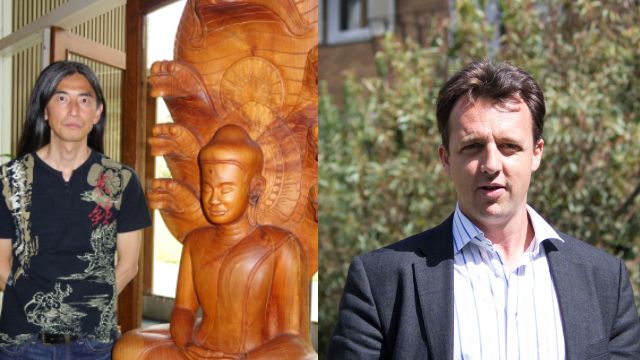ARC Future Fellowships for two ANU philosophers

Dr Koji Tanaka (left) and Dr Nicholas Southwood
Two philosophers at The Australian National University have received esteemed Future Fellowships from the Australian Research Council.
Dr Nicholas Southwood’s $733,000 international project will examine feasibility in politics with partners including the World Bank, while Dr Koji Tanaka’s $655,000 grant will assess Buddhist philosophical ideas of logic and rationality.
Four ANU School of Philosophy projects received ARC funding in 2016: Dr Seth Lazar and Professor Daniel Stoljar were awarded Discovery Project grants to develop a theory of risk, and study states of consciousness, respectively.
Dr Southwood’s Future Fellowship aims to better understand the nature and proper role of feasibility in political arguments.
"Claims about feasibility are pervasive in social and political life,” Dr Southwood says.
“Open a newspaper, turn on a radio, and the chances are that you’ll be assailed by people arguing about the feasibility of responding to the threat of terrorism, improving health in indigenous communities, and so on and so forth.”
“But what is not so clear is how we should think about this preoccupation with feasibility. What exactly are we arguing about when we argue about the feasibility of, say, a global emissions trading scheme? How should we go about finding evidence for and against different feasibility claims? And what are admissible and inadmissible uses of feasibility in political arguments?"
“This last issue is a particularly difficult one because it’s hard to strike the right balance,” Dr Southwood explains.
“We know that insensitivity to feasibility considerations may result in political action that is naïve or even catastrophic. Yet we also know that an undue preoccupation with feasibility may lead us to settle for less than we should. How can we avoid chasing potentially dangerous pies-in-the-sky without letting political agents, or ourselves for that matter, too easily off the hook?”
The project will involve collaborating with colleagues from three academic host institutions, Princeton, Oxford, and the London School of Economics, and the World Bank’s Global Insights Initiative.
Some of Dr Southwood’s earlier collaborative work helped to form the theoretical basis of the chapter on norms of the Bank’s 2015 World Development Report.
“The World Bank is very interested in our work on feasibility, particularly with regard to one of the applications we want to look at, poverty,” Dr Southwood says.
“They recognise that there are significant institutional impediments to alleviating poverty. Getting a better understanding of institutional dimensions of feasibility is of relevance to their core policies and programs.”
Dr Tanaka’s study, meanwhile, will draw on Buddhist logic texts and show how they are relevant to Western debates about the nature of logic.
Logic is a systematic study of understanding what counts as a good reason, and separating good reasoning from bad, he says.
“My first goal is to enrich our understanding of what logic is,” the former computer scientist says.
“What logic is is fixed in the western academic tradition, so one aim of this project is to challenge that.
“Secondly, in doing this, it overturns the impression many philosophers have about Buddhist philosophy, and Asian philosophy generally, that they don’t see the value in investigating those traditions.
“One thing I hope to do as part of this project is contribute to the diversification of the philosophy profession,” he says.
“Now, in Western academia, philosophy basically means Western philosophy, with the canonical texts written by white men.
“What I hope to be able to contribute to is to start changing the culture where what counts as canonical starts changing, that at least some of the Buddhist thinkers can be treated as equally as the canonical thinkers.”
Dr Tanaka's collaborative research project will include workshops, a book, and working alongside Buddhist scholars, especially Emeritus Professor Tom Tillemans from the University of Lausanne, who is one of the most renowned scholars in Buddhist Studies.
Beyond the academy, Dr Tanaka also hopes to inform Australian-Asia relations.
“I hope I can convey the message that communication is not just the exchange of information, but takes place in the form of asking reasons why someone thinks the way they do.
“If Australia is really interested in communicating with Asian countries, one thing it has to be able to understand is why Asian people think the way they do.
“I hope my project can have an impact in the way that Australians communicate with Asian countries, many of which are Buddhist.”